Key takeaways:
- Urban Telematics Network enhances urban life by integrating technology to monitor and improve municipal services, fostering informed decision-making.
- Participation in local eco-surveys connects community members and helps identify environmental issues, empowering citizens to influence urban planning and sustainability initiatives.
- Sharing survey results through visual storytelling and online platforms amplifies impact, inspiring community dialogue and collective action toward environmental challenges.
- Individual involvement in eco-surveys reinforces the significance of personal actions and voices in promoting sustainable practices and community well-being.

Understanding Urban Telematics Network
Urban Telematics Network (UTN) encompasses the integration of technology and urban infrastructure to gather and analyze data. I’ve often marveled at the seamless way it connects various elements of city life, from traffic flow to environmental conditions. It prompts me to wonder: how much smarter can our cities become by leveraging this data?
During my experience with UTN projects, I’ve seen firsthand how sensors and digital tools monitor everything from air quality to public safety. I remember walking through a park one day and noticing the real-time data displays that informed visitors about pollution levels. It was a powerful reminder of how knowledge can empower communities to take action.
Clearly, the potential of an Urban Telematics Network is immense. It fosters a deeper understanding of urban dynamics, leading to more informed decision-making. I often reflect on how this technology will shape our interactions and experiences in city spaces, making them not only more efficient but also more responsive to our needs as urban dwellers.
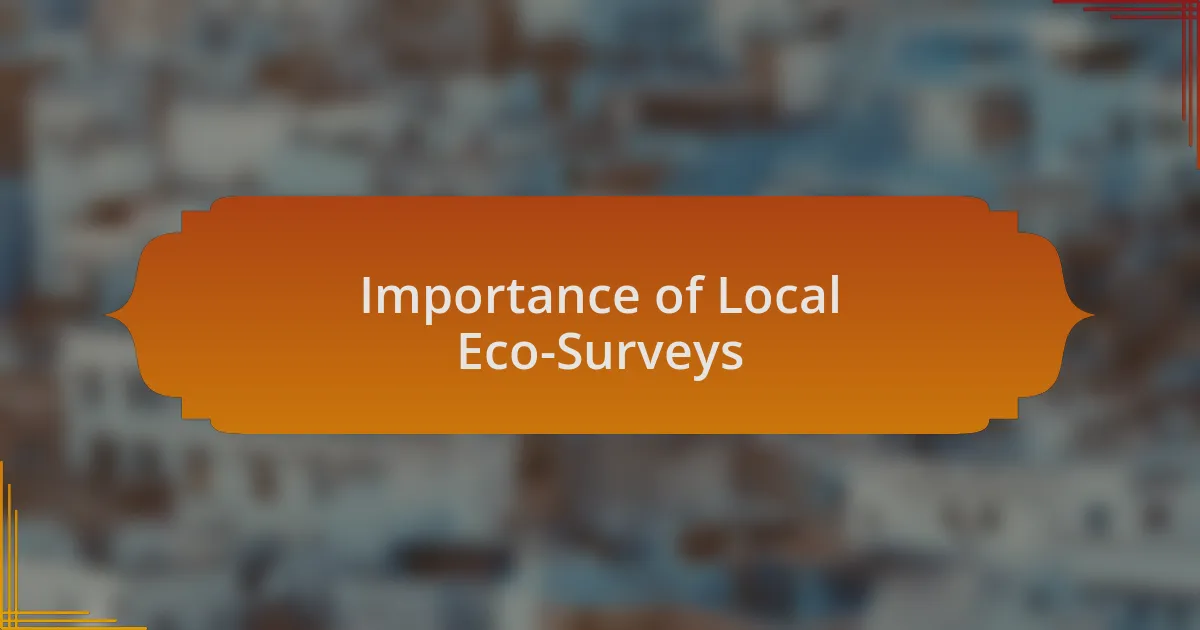
Importance of Local Eco-Surveys
Local eco-surveys play a crucial role in understanding the environmental landscape of our communities. I remember participating in one such survey where we mapped out local green spaces and noted down the types of vegetation present. It was eye-opening to see how much biodiversity exists right in our backyards and realize how our actions can either support or threaten that diversity.
Engaging in these surveys provides valuable data that can influence local policies. For instance, during a survey I helped with, we discovered areas prone to flooding that weren’t previously on anyone’s radar. That information led to discussions with local officials about implementing green infrastructure solutions. It’s moments like these that make you realize how community involvement can directly affect urban planning and environmental health.
Moreover, the personal connections made during eco-surveys are what truly resonate with me. Not only do I connect with the environment, but I also build relationships with fellow citizens who share a passion for sustainability. I often ask myself: who better to understand the needs of a community’s ecosystem than the people who live there? Engaging in these surveys fosters a sense of shared responsibility and empowers us to advocate for our beloved urban environments.
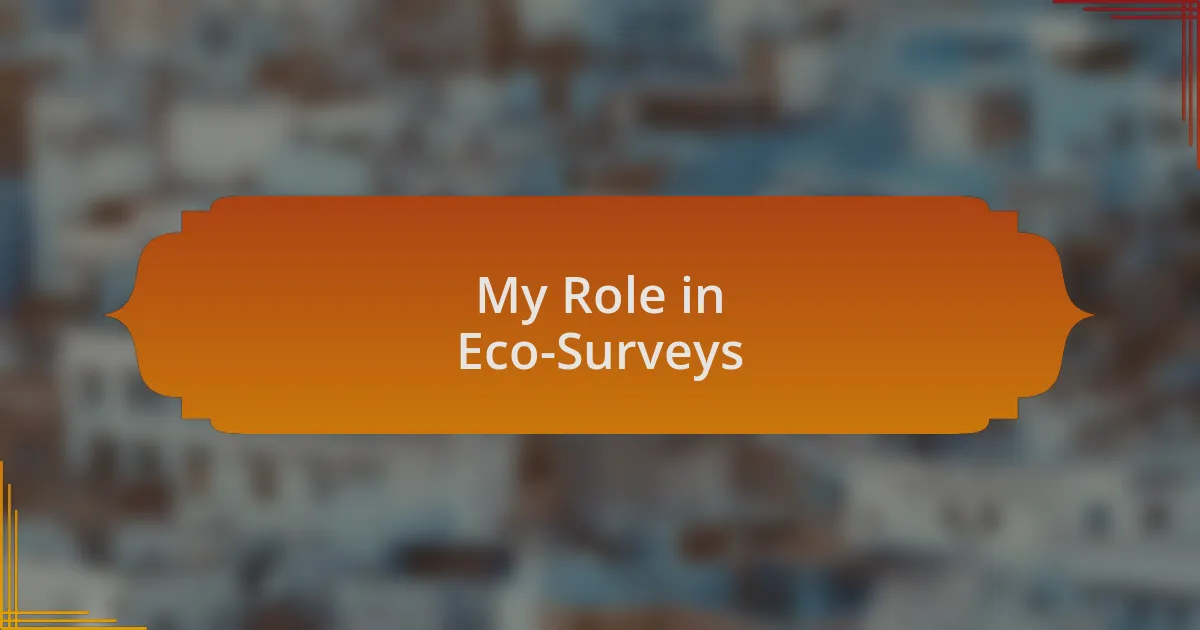
My Role in Eco-Surveys
My role in eco-surveys often feels like stepping into a collaborative puzzle. Each time I join a survey, I’m not merely contributing data; I’m an active participant in weaving a narrative of our local ecosystem. Recently, as I recorded observations on air quality near a busy street, I couldn’t help but feel a deep connection to the findings. Don’t you ever wonder how our individual efforts can illuminate broader environmental issues?
When participating in these projects, I sometimes take on the role of a community liaison, sharing experiences with other citizens interested in the health of our environment. I vividly recall a survey where we gathered at a local park, each of us bringing our unique perspectives on how urban development has affected wildlife habitats. The discussions were enlightening and sparked a renewed sense of urgency within me. How often do we allow our voices to blend and shape community action in meaningful ways?
Additionally, my experience extends to compiling and analyzing the data we collect, a task that often surprises me with its significance. I find joy in spotting trends and correlations that can drive change. Just as I reviewed the survey data from the previous year, I felt a surge of hope knowing we were highlighting areas that needed attention. What could be more fulfilling than using that information to advocate for a greener future?
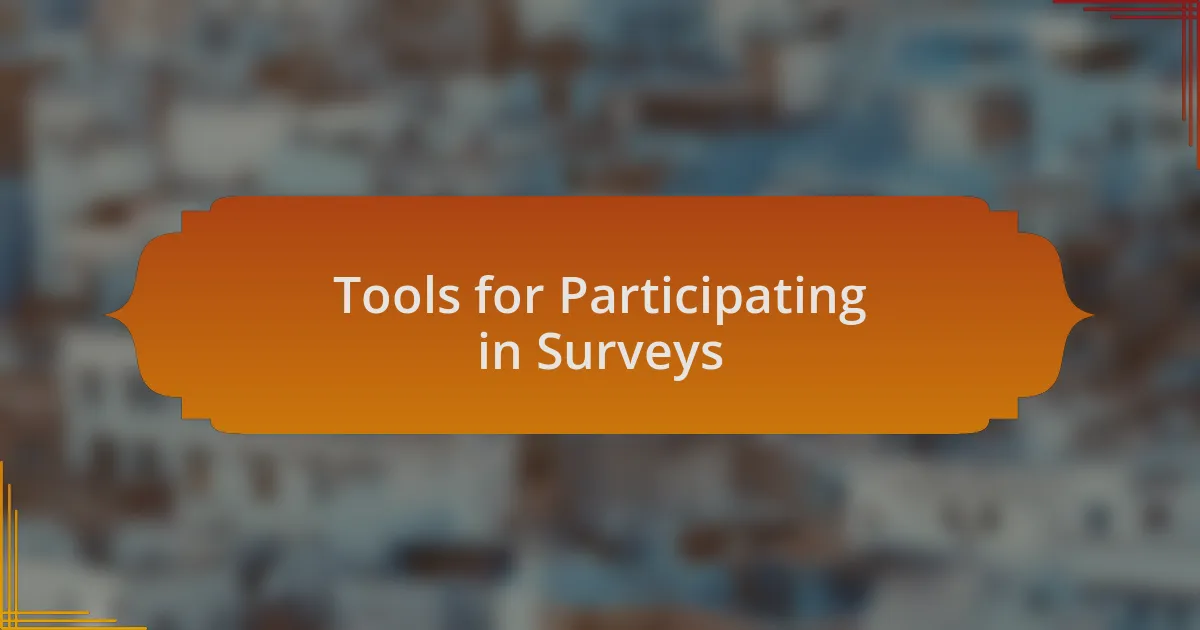
Tools for Participating in Surveys
Participating in eco-surveys requires a variety of tools that enhance both data collection and engagement with the community. For instance, I often use mobile apps specifically designed for citizen science. These tools not only make it easy to record observations on the go but also create a platform for dialogue with fellow participants. Have you ever noticed how technology can transform a simple survey into a vibrant community project?
Beyond digital tools, I find that physical resources, such as field guides for local flora and fauna, are incredibly valuable. One time, armed with a guide, I was in my neighborhood documenting native plants. The experience felt almost like a treasure hunt, where each discovery deepened my appreciation for our local ecosystem. Isn’t it fascinating how the right tools can amplify our understanding and connection to the environment we share?
Lastly, I can’t overlook the significance of community workshops. These gatherings often utilize collaborative tools like whiteboards and sticky notes. I remember a workshop where we mapped out pollution sources in our area. The energy was electric, and watching everyone contribute their insights made me realize how effective teamwork can supercharge our survey efforts. How often do we overlook the power of collaboration and shared knowledge in environmental endeavors?
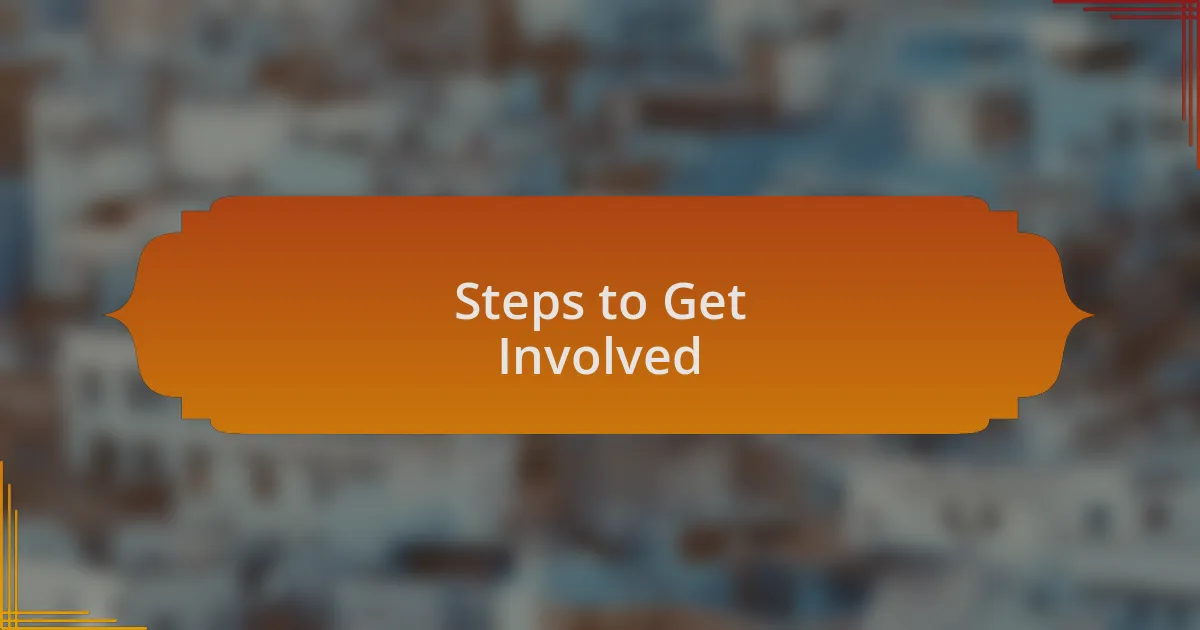
Steps to Get Involved
Getting involved in local eco-surveys is simpler than you might think. Start by reaching out to local environmental organizations or community groups. I remember the first time I contacted a local group; I was nervous but pleasantly surprised by how welcoming they were. They quickly plugged me into ongoing projects, making it easy for me to participate and contribute.
Consider attending an introductory meeting or workshop focused on eco-surveys. I vividly recall attending one such session; the excitement in the room was infectious. It was an environment where people shared their personal experiences and passion for sustainability. You can learn so much just by listening and connecting with others who share the same interests. Plus, these gatherings often provide the foundational knowledge you’ll need to get started.
Finally, don’t underestimate the power of social media and online platforms. When I began following local eco-initiatives on platforms like Facebook, I stumbled upon a community event that piqued my interest. Engaging in discussions online opened doors to offline activities, and I was able to find volunteering opportunities right in my backyard. How has technology connected you to your local environmental community?
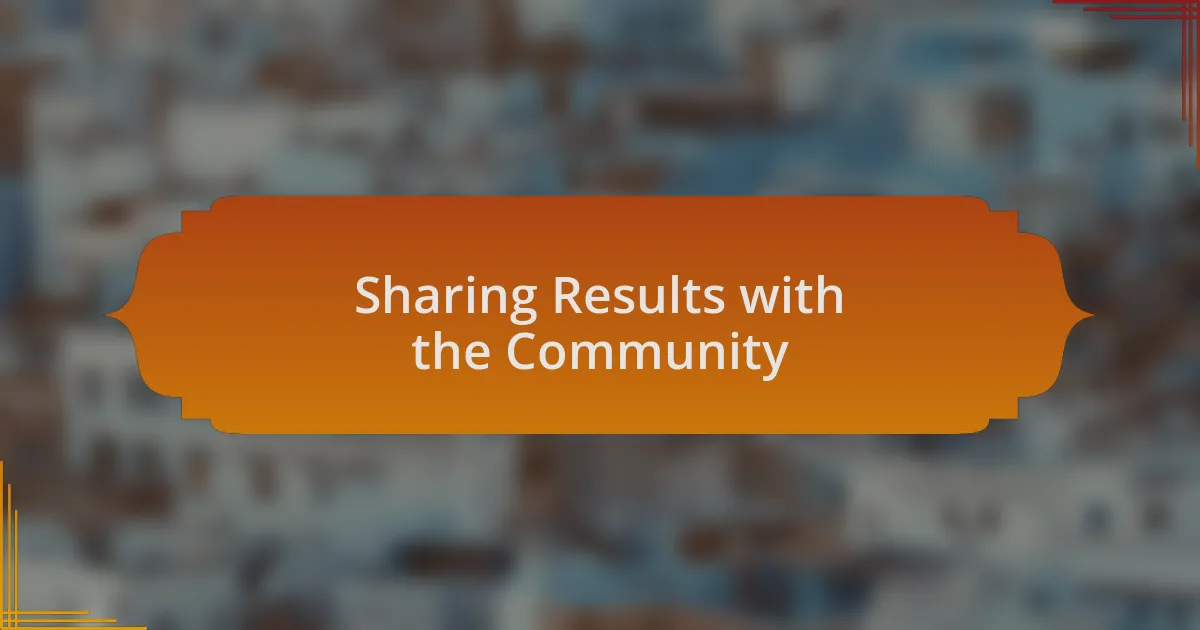
Sharing Results with the Community
After participating in local eco-surveys, sharing the results with the community can truly amplify impact. I recall the excitement I felt when our team gathered to present our findings at a community meeting. The energy in the room was palpable, and witnessing the enthusiastic responses reinforced my belief in the value of transparency. It made me realize that sharing data not only informs but also inspires collective action.
One effective way I’ve found to share results is through visual storytelling. Whether it’s a colorful infographic or a dynamic presentation, these tools can really breathe life into raw data. I remember crafting an engaging visual summary of our survey results, and it sparked thoughtful questions and conversations among attendees. It’s amazing how visuals can bridge gaps and make complex information accessible to everyone, fostering a deeper connection with the community.
Moreover, leveraging online forums and community social media pages can enhance engagement significantly. I once posted our eco-survey results on a local group page and was amazed by the discussions it ignited. People shared their own insights, challenges, and even proposed actionable ideas. It taught me that results are more than just numbers—they are a catalyst for dialogue and progress. Have you ever shared findings that sparked a broader conversation in your community?
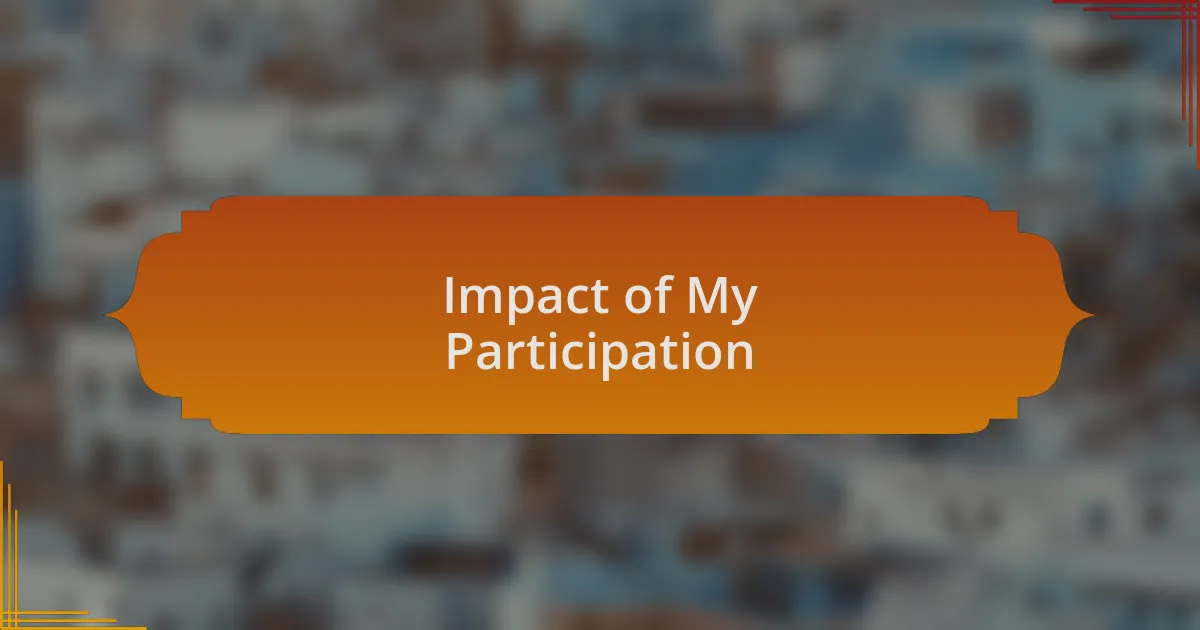
Impact of My Participation
Engaging in local eco-surveys has profoundly impacted my perspective on environmental issues. I remember an instance where my participation led to unexpected connections with neighbors who were equally passionate about sustainability. This shared purpose not only strengthened community ties but also fueled collaborative efforts toward implementing eco-friendly practices in our neighborhood. Have you ever felt that sense of camaraderie when working toward a common goal?
My involvement also allowed me to better understand the specific challenges faced by our community regarding sustainability. While reviewing survey results, I was struck by the disparity in resources available to different areas. This realization pushed me to volunteer for initiatives aimed at addressing these gaps, connecting me with local organizations that share similar missions. It’s empowering to know that my efforts contribute to not just data collection but also meaningful change that impacts real lives.
Lastly, I’ve found that my participation serves as a powerful reminder of the impact of individual action on communal well-being. By speaking up in meetings and sharing my insights, I inspire others to reflect on their role in environmental stewardship. I can recall a moment when my simple comment about reducing plastic use prompted several attendees to commit to personal changes. It reinforced the idea that each voice matters in the larger conversation about sustainability. Isn’t it fascinating how seemingly small actions can ripple out, encouraging others to join the cause?